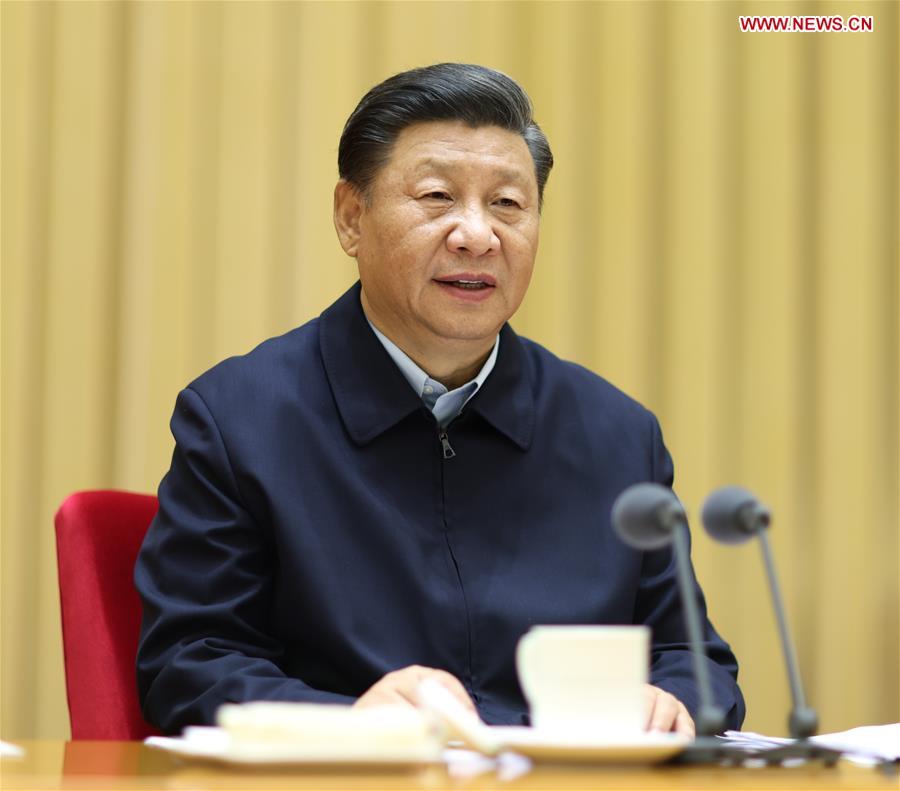Xi calls for law-based governance, unity via long-term efforts at Xinjiang meeting
By Zhang Hui and Liu Xin Source: Global Times Published: 2020/9/26 23:38:40 Last Updated: 2020/9/26 23:45:51

Chinese President Xi Jinping, also general secretary of the Communist Party of China (CPC) Central Committee and chairman of the Central Military Commission, attends the third central symposium on work related to Xinjiang, in Beijing, capital of China. The symposium was held on Friday and Saturday in Beijing. (Xinhua/Ju Peng)
Six years after the last central work conference on Xinjiang, and with the security situation fundamentally changed, the Chinese central government held a third central work conference on Xinjiang on Friday and Saturday in Beijing, stressing building Xinjiang featuring socialism with Chinese characteristics in the new era.
Experts noted that the work conference on Xinjiang was held a month after the 7th work conference on the Tibet Autonomous Region, which shows that China has strengthened its top-level design on anti-separatism and development work in its border regions, and has worked hard to make the Chinese people of all ethnic groups enjoy the benefits of the country's development.
President Xi Jinping, also general secretary of the Communist Party of China (CPC) Central Committee and chairman of the Central Military Commission, stressed at the third central symposium on work related to Xinjiang the need to fully implement the CPC's policies and strategies on governing Xinjiang, which include maintaining stability in the region through ethnic solidarity.
Xi demanded law-based governance and long-term efforts to develop Xinjiang into a region that is united, harmonious, prosperous, and culturally advanced, with healthy ecosystems and people living and working in contentment.
Xu Jianying, director of the Research Center for Chinese Borderland History and Geography of the Chinese Academy of Social Sciences, told the Global Times on Saturday that the third conference was held when the overall situation of Xinjiang has been fundamentally changed with effective anti-terrorism measures, which was very different with the second one, when Xinjiang was still plagued by severe threats of terrorism.
At the second central work conference on Xinjiang in May 2014, Xi called for "nets spread from the earth to the sky" to defend against terrorist acts in Xinjiang, and urged the region to strengthen precautions and international anti-terrorism cooperation.
The 2014 meeting was held 10 days after a series of bloody terrorist attacks in the region, including one in an open air market in Urumqi, the region's capital, which left 39 people dead and 94 injured on May 20, 2014.
There have been no terrorist attacks in Xinjiang for three years and nine months so far, which has been regarded as the greatest achievements of Xinjiang's de-radicalization and anti-terrorism efforts in the past years.
"This year's work conference also sends a signal that China's policies in the region have entered a new phase - from cracking down on terrorism to restoring social order to emphasize the fostering of a sense of community of the Chinese nation, rule of law, improving of local residents' livelihood and regional prosperity," Cao Wei, executive director of the national security research center of the School of Politics and International Relations in Lanzhou University, told the Global Times.
During the work conference, Xi stressed efforts to focus on heightening a sense of identity of the Chinese nation to constantly strengthen ethnic unity, urged to adhere to the localization of Islam to realize the healthy development of the religion and deepen the ideological work and to promote cultural development in Xinjiang.
Xinjiang has been plagued by terrorism and separatism, with separatists maliciously promoting isolation among the cultures of different ethnic groups. To foster a sense of community of the Chinese nation would help wipe out separatism, Cao noted.
In response to some anti-China forces and Western countries' hype on China's policies in its Xinjiang region, Cao said that it is the residents in Xinjiang who have the final say on Xinjiang's affairs. The recent year's stable life, prosperous economic development and improving living standards are enough to debunk slander on China's polices in the region, Cao said.
The latest work conference on Xinjiang came a month after China's 7th work conference on Tibet region. Cao said that the two conferences on China's border regions show that the central government has strengthened a united top design on important border areas, which previously experienced similar problems on separatism.
The security and development of Xinjiang and Tibet regions are closely related to China's future development, as the country is working hard to complete the building of a moderately prosperous society in 2020, so all ethnic groups in China would enjoy the fruits of development, Cao said.
Posted in: SOCIETY